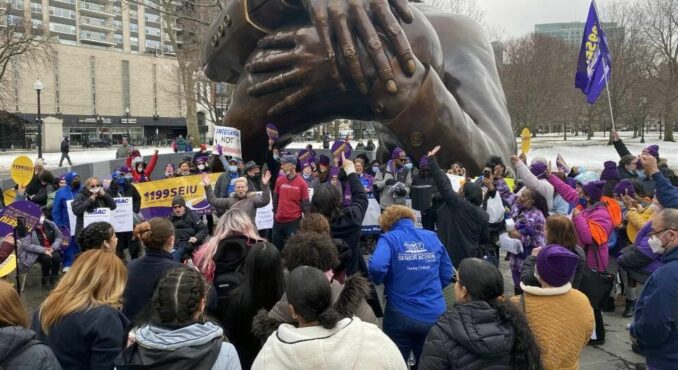Boston personal care attendants demand ‘living wage, now!’
Around 200 people with disabilities and the personal care attendants who help them gathered at the Embrace Statue March 1, honoring Martin Luther King Jr. on the Boston Common and demanding living wages and benefits for Massachusetts PCAs.

Boston Commons, March 1, 2023. Photo: Megan Smith
Organized by Service Employees 1199 United Healthcare Workers East and a coalition of disability rights and justice organizations, including the Boston Center for Independent Living (BCIL), the Disability Policy Consortium and all Massachusetts independent-living centers, the rally called attention to the dire shortage of PCAs in Massachusetts, caused by low pay and grossly inadequate benefits. The Massachusetts PCA Program provides care and support to elderly people and people with disabilities in their daily lives.
Despite working up to 50 hours a week at multiple jobs, most PCAs, who are primarily immigrant women of color, make $17.80 an hour and lack crucial job security and benefits. These conditions have led to chronic understaffing, with many people with disabilities unable to get help from PCAs.
“The shortage of PCAs has reached a crisis,” Diana Hu, chairperson of BCIL explained. “I rely on my PCAs to be able to eat, sleep, work and sustain a meaningful life in the community. Independent and dignified living for tens of thousands of people across the state comes under threat without access to PCA services.”
A living wage: $25 an hour
Brian Shea, a longtime disability-justice leader and member of Workers World Party’s Disability Justice and Rights Caucus, who attended the March 1 rally with his PCA, stressed the need to address PCAs’ demands.
“SEIU 1199 is coming up for contract negotiations with the state,” Shea explained. “The contract demands put out at the rally include a minimum $25 an hour — a living wage. Workers talked about the need for stable housing and for retirement — they don’t even have a 401k. There are people who have been doing this work for 20-plus years, and they have nothing to show for it. That’s criminal.”
“The people who do this work are motivated to make a difference for people,” Shea continued. “It’s a part of the criminality of capitalism that people who do this work for disabled people get nothing for it. Pressure needs to be exerted to raise the pay to $25 an hour and have sick pay and paid time off, which PCAs don’t have right now.”
From the Boston Common, protesters marched to the Massachusetts statehouse to give Governor Maura Healey a letter listing their demands. These include, in addition to those named by Shea, additional health and safety protections and new training programs for career advancement.
“We shouldn’t have to work three or four jobs to make ends meet,” said Isaias Ruiz, a PCA attending the union rally. “And we should be able to save and invest for retirement.”
Pressured by disability-justice groups, Healey has promised to support the PCA program. The March 1 action underscored the need to force her newly elected Democratic administration to follow through on its pledge. Winning these concessions from the state will allow people with disabilities to receive a modicum of the support they need amid the capitalist state’s ongoing eugenicist assault on their rights and lives.
Tens of thousands of state residents eligible for PCA services are now illegally forced to go without, due to the dire PCA shortage caused by the pandemic and unlivable wages and working conditions.
“People who do this work, who look after elders with disabilities, do not have their work valued by those in the system, like teachers’ work is not valued, like nurses’ work is not valued,” said Shea. “This is a system that needs to die. We can do better, and together we will do better.”

